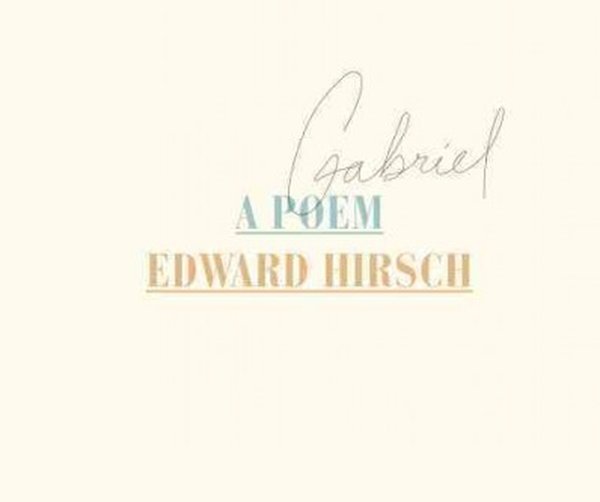Poetry Review: “Gabriel, A Poem” — A Terrible Beauty
By Roberta Silman
Gabriel is a searing experience to read, filled with sadness but also humor and forbearance, and may give comfort to parents who are dealing with difficult children.
Gabriel, A Poem by Edward Hirsch, Alfred A. Knopf, 78 pages. $26.95
Just before the start of Hurricane Irene, a young 22-year-old named Gabriel, who shunted between his divorced parents in Brooklyn and on the Upper West Side, went missing. It turned out that he had gone to a party in Jersey City, was given (we assume voluntarily) a party drug by people he didn’t know, had a seizure, and died of heart failure. A story we have all heard before, but this young man was the adopted son of the poet Edward Hirsch and Janet Landay, and instead of an anonymous death filed in the annals of “Kids Lost to Drugs,” he is immortalized in a 78-page poem by his father called, simply, Gabriel.
Already the subject of a long article by Alex Wilkinson in The New Yorker, Gabriel’s back story has become public knowledge. In addition to reviews, mostly admiring, and a nomination for a National Book Award in the nonfiction category, the book was also a topic on the PBS News Hour where Hirsch talked about Gabriel’s life and untimely death, and the enormous grief that he, as the boy’s father, has lived through. There will undoubtedly be many more reviews. But I am writing this more in the nature of a heads up to readers of the Arts Fuse that this long poem about the grief of losing a child has entered the American canon. It will undoubtedly stand beside lots of other works of art about such grief—Mahler’s Songs, poems by Mallarmé, the Polish medieval poet Kochanowski, and others—into eternity.
But what interested me and may interest other readers was the huge burden of loving this adopted child (they got him at five days), who was clearly a tremendous handful. Of fathering this child who had all sorts of “issues” that never coalesced into a clear diagnosis, but whose behavior required therapists and doctors and drugs and special schools and constant concern, even when he reached adulthood. To try so hard, to love so hard, and to be left with such all-consuming, guilt-ridden grief seems a sentence beyond bearing. And yet Edward Hirsch, who is president of the John Simon Guggenheim Memorial Foundation, a well-known poet, a recipient of a MacArthur Fellowship, felt that he had to write his way not only out of his grief, but also the awful facts of Gabriel’s life. To somehow put them into perspective so he could go on living.
This kind of courage is unique, and it is interesting that the boy’s mom has not participated in any way in Hirsch’s project; she feels that Gabriel’s life and death are private matters, although from The New Yorker piece it is hard not to conclude that Gabriel’s difficulties contributed to Hirsch and Landay’s divorce. But, as we all know, each person deals with hurt and disappointment and sorrow in his/her own way.
Written in three-line stanzas (echoing Dante’s terza rima), each page is a poem of ten stanzas, unrhymed, and thus different from Dante, yet each capable of standing on its own. Most of it is in Hirsch’s voice, although there are many quotations from Gabriel, who was funny and smart and exasperating, and there are also a few poems in the voice of Gabriel’s friend Joe. It is a searing experience to read, filled with sadness but also humor and forbearance, and may give comfort to parents who are dealing with difficult children, and also may bring a kind of catharsis to those who have lost children easier to love than Gabriel was. In closing, I will quote two passages I will never forget from this poem that has been called “a masterpiece of sorrow.” Here is Hirsch, clearly haunted by his Jewish heritage, berating himself:
And the Father the Law
Who should have been handing down
Commandments from on high
What was he doing all those years
When he should have been reassuring his wife
And taking charge of his son
What was he doing when he should have been
Standing fast and overruling the experts
Who were guessing what to do
He should have been teaching him
Character teaching him values teaching him
To become the man he was meant to become
What was he doing the Father the Law
In the exact middle of life
But fighting for his vocation
And here he is describing the last night:
He was a secret
We could not decipher
And no one would help us find him . . .
And I never saw him alive again
Most reckless of reckless angels
Who left the house during a rainstorm
Gabriel has the kind of “terrible beauty” that Yeats talked about; such works are beyond the realm of criticism, and I can only hope that the completion of this important poem has given Hirsch a measure of comfort and, perhaps, a way towards the possibility of some peace.
Roberta Silman is the author of a story collection, Blood Relations, now available as an ebook, three novels, Boundaries, The Dream Dredger, and Beginning the World Again, and a children’s book, Somebody Else’s Child. A recipient of Guggenheim and National Endowment for the Arts Fellowships, she has published reviews in The New York Times and The Boston Globe, and writes regularly for Arts Fuse. She can be reached at rsilman@verizon.net.

